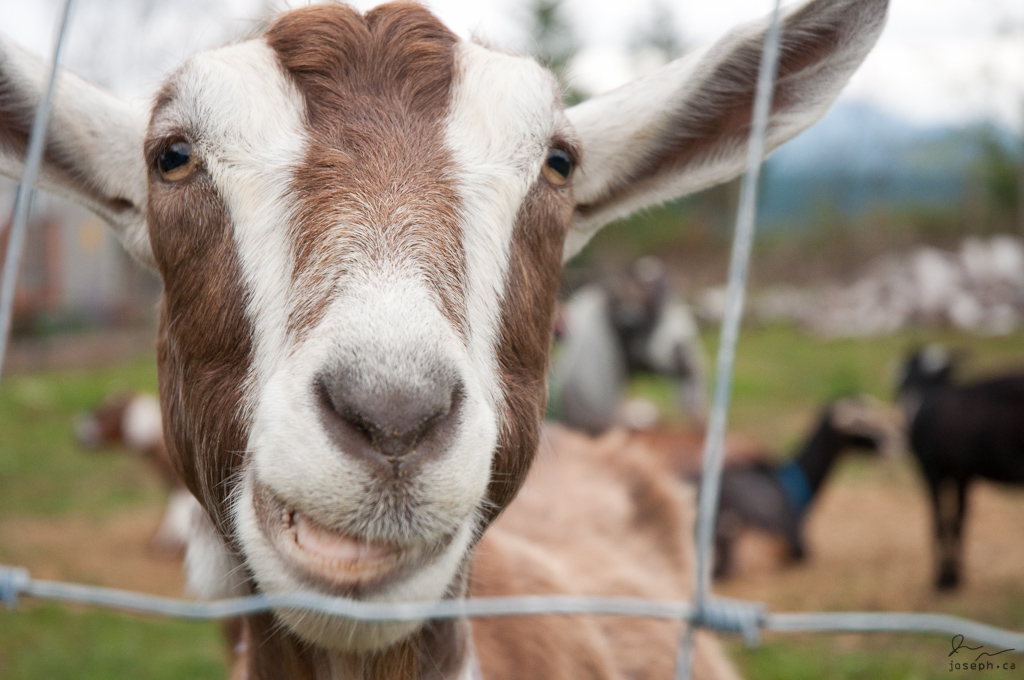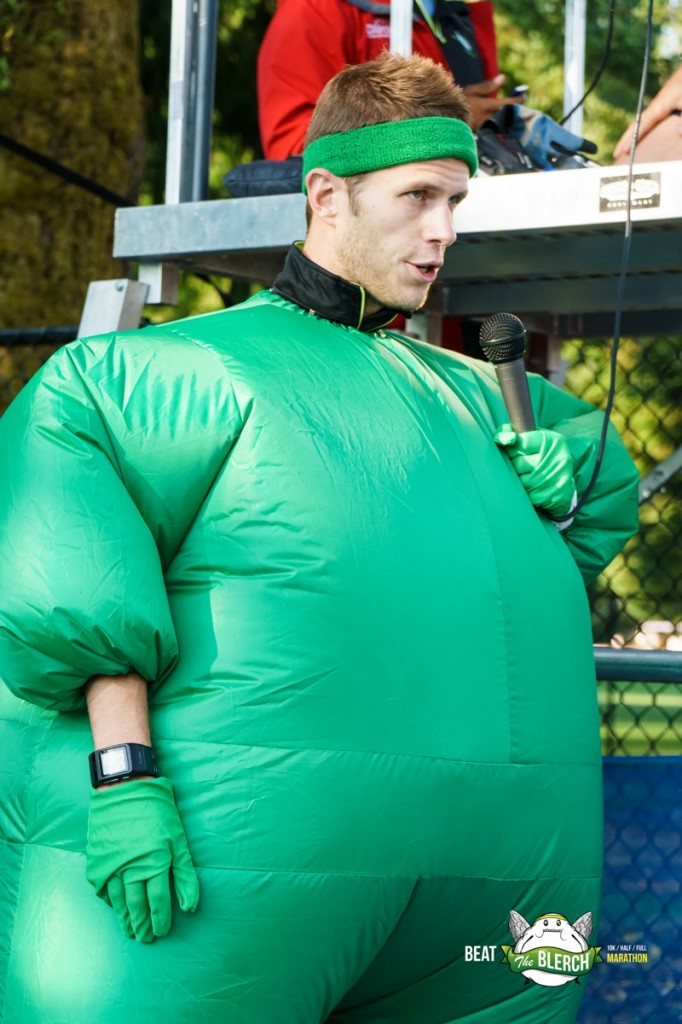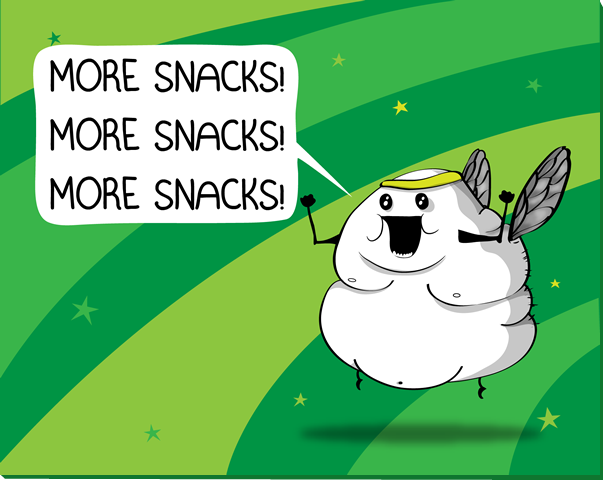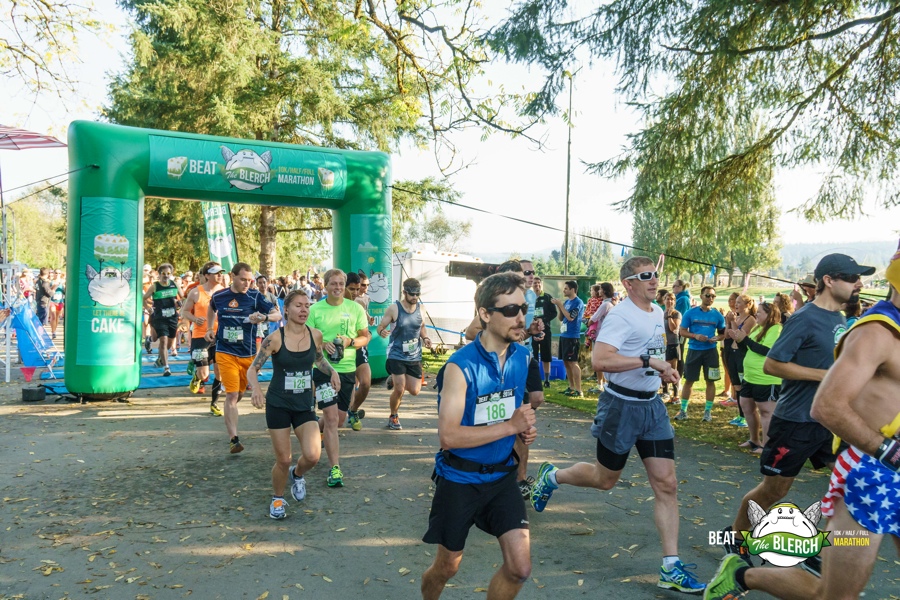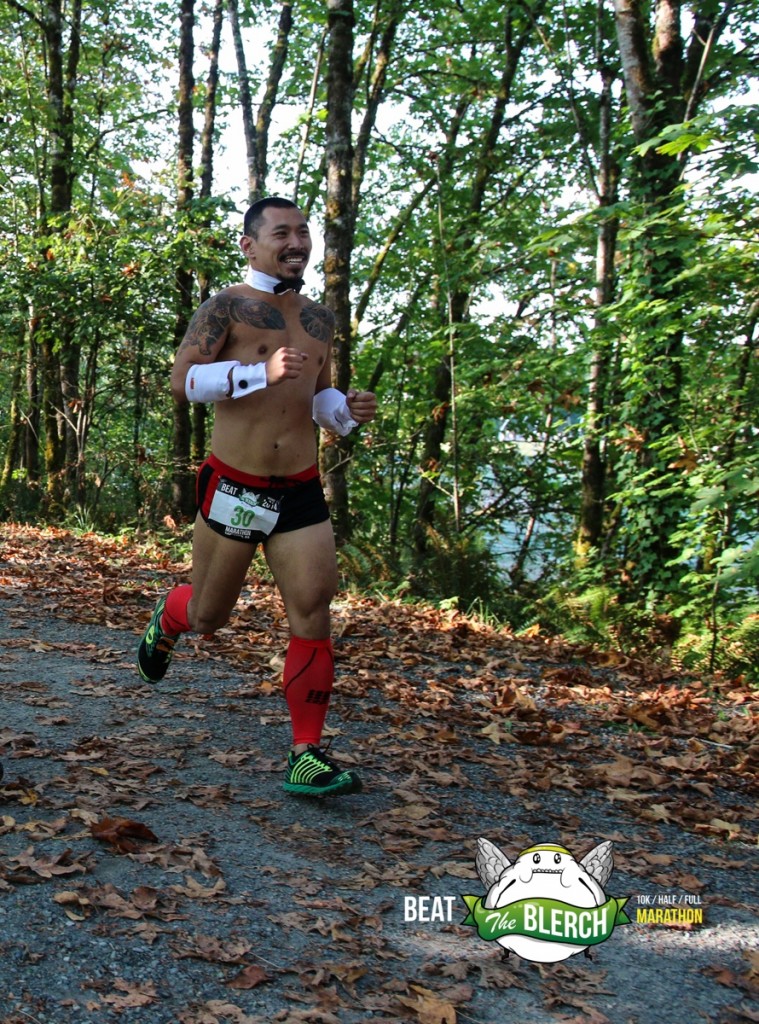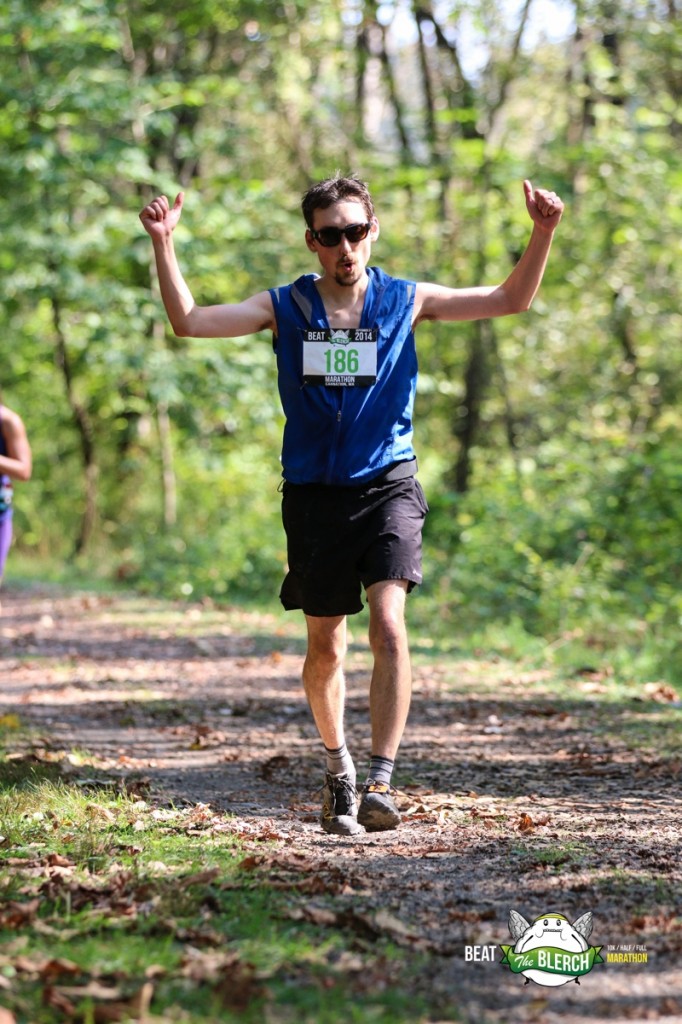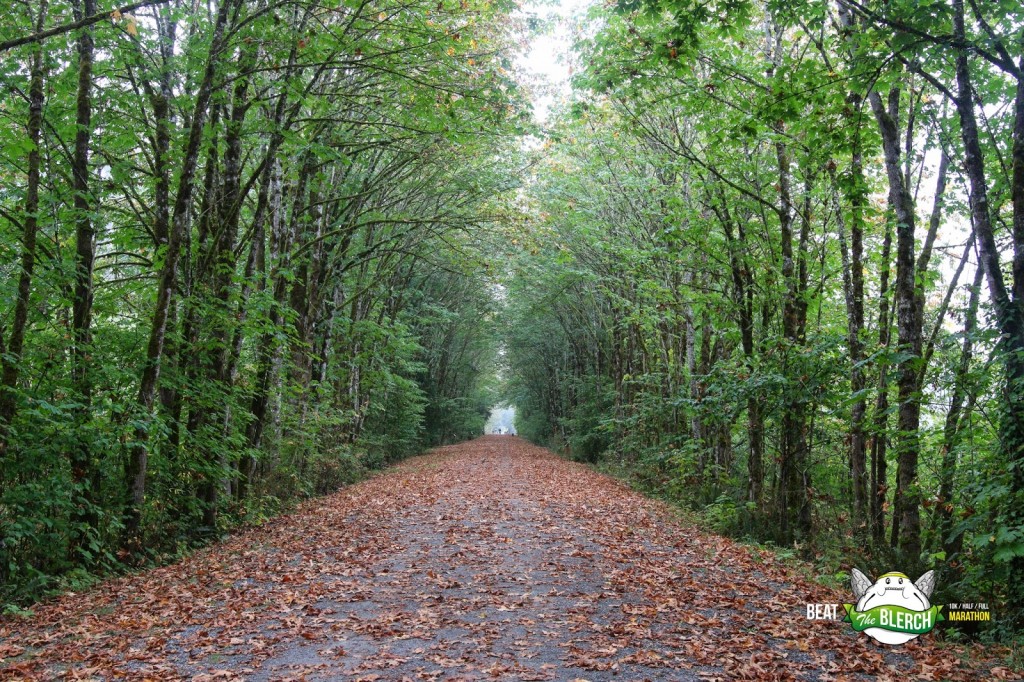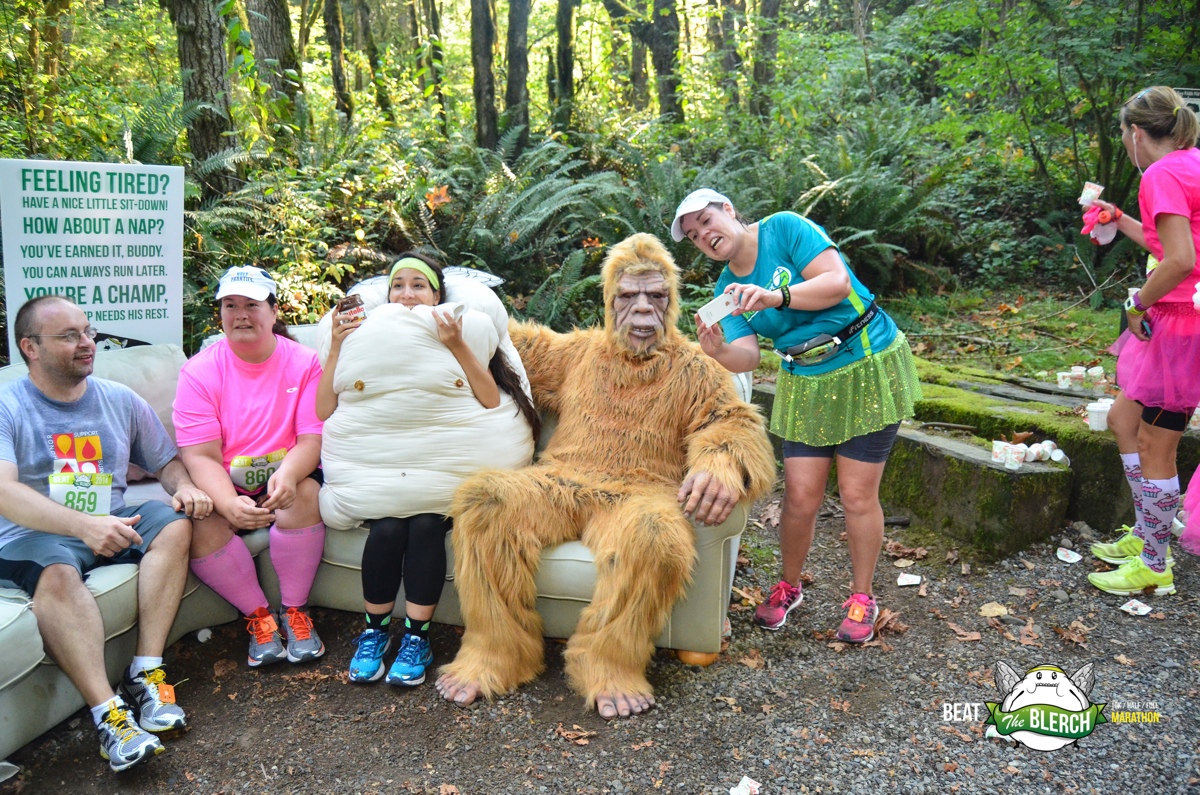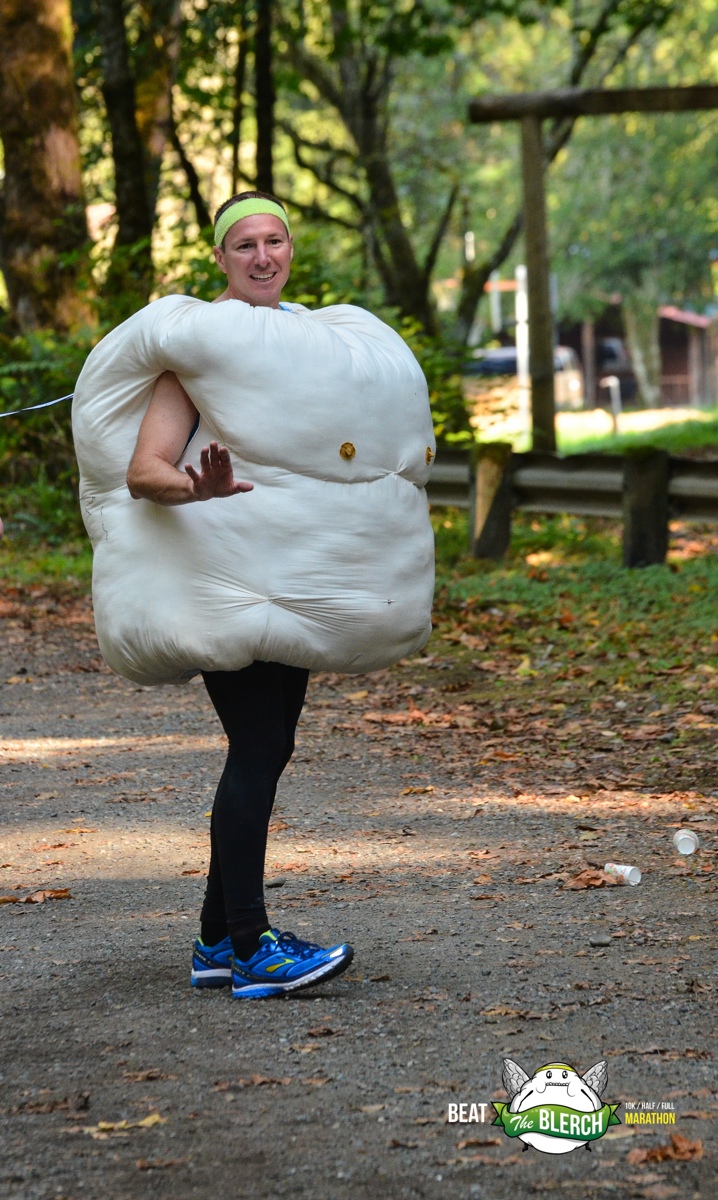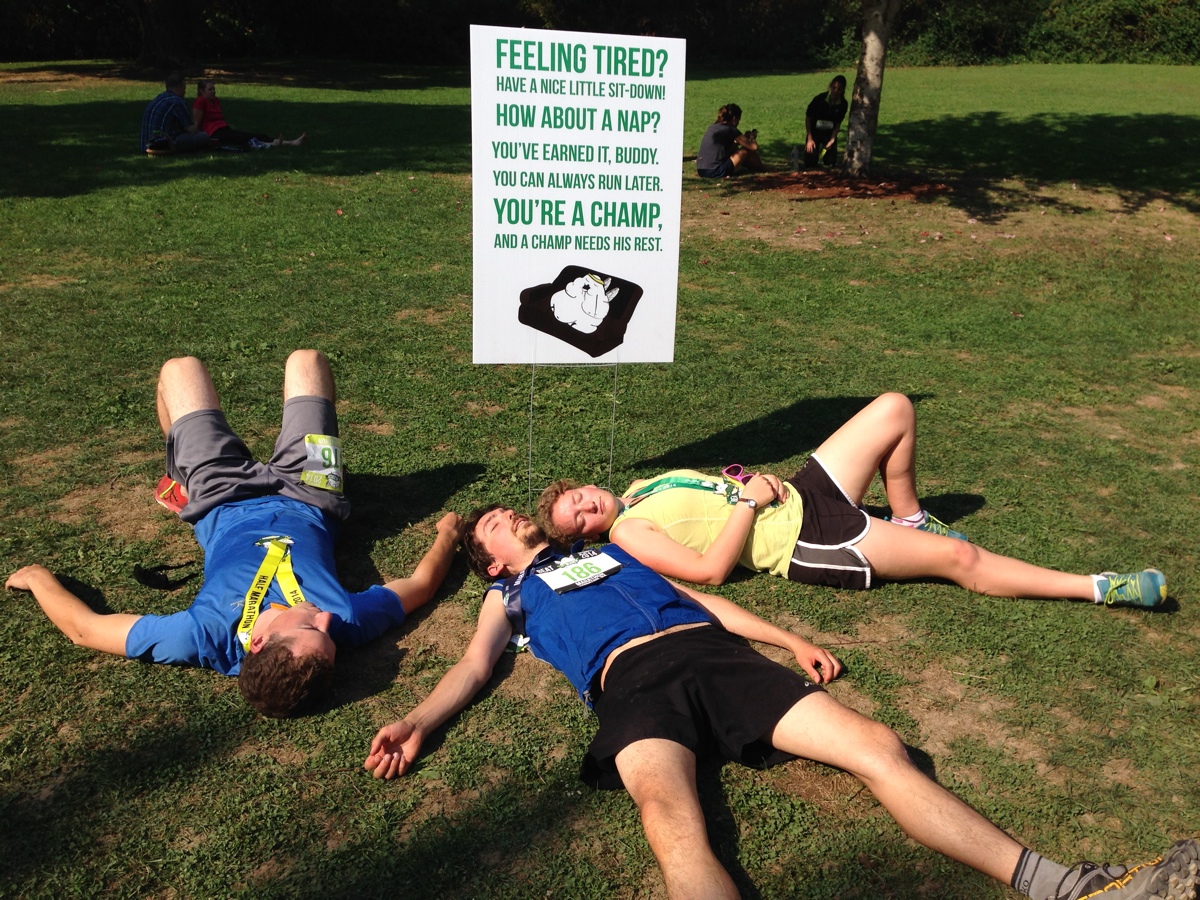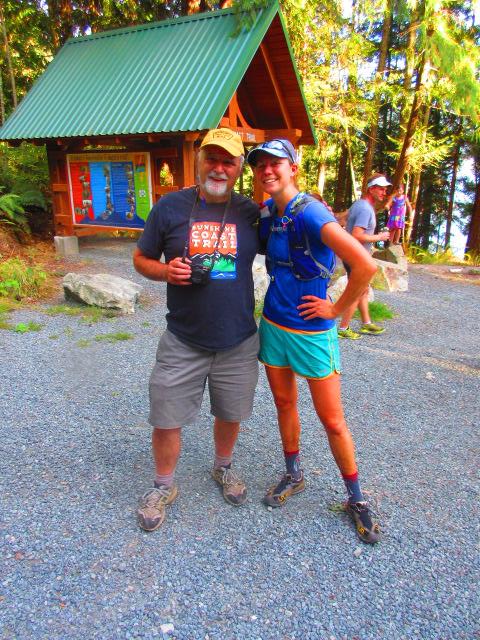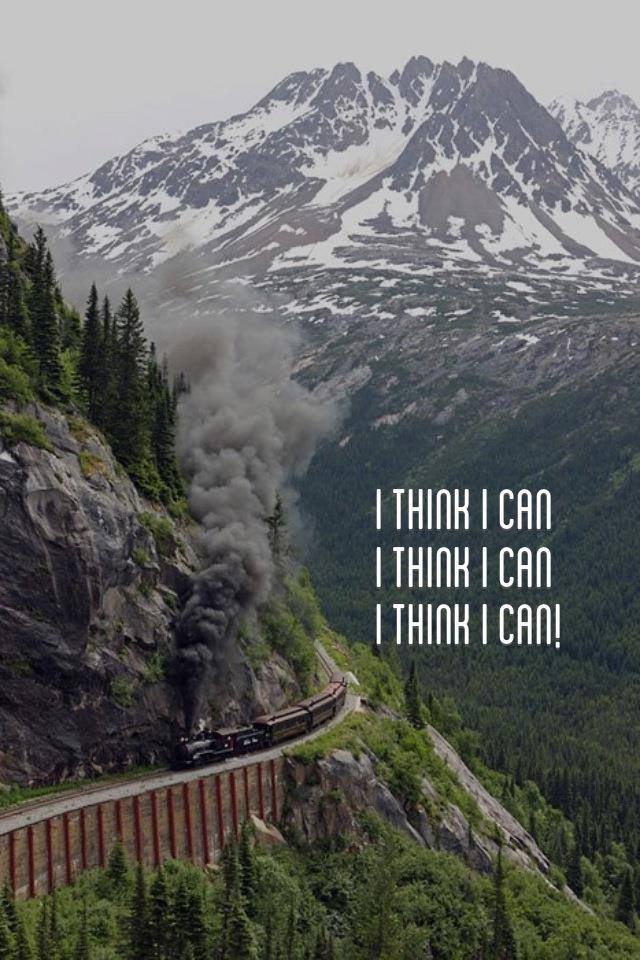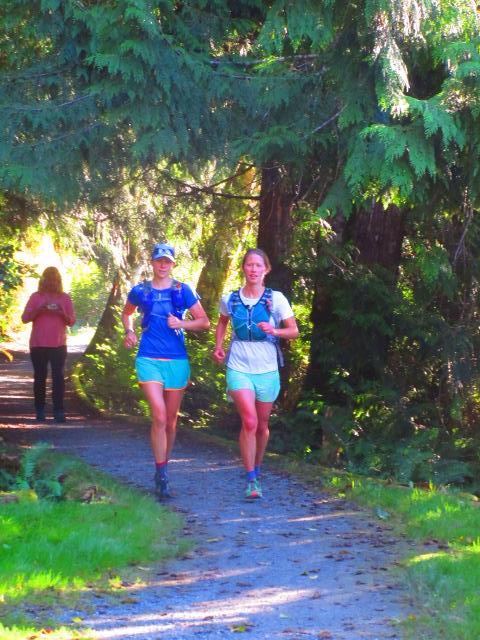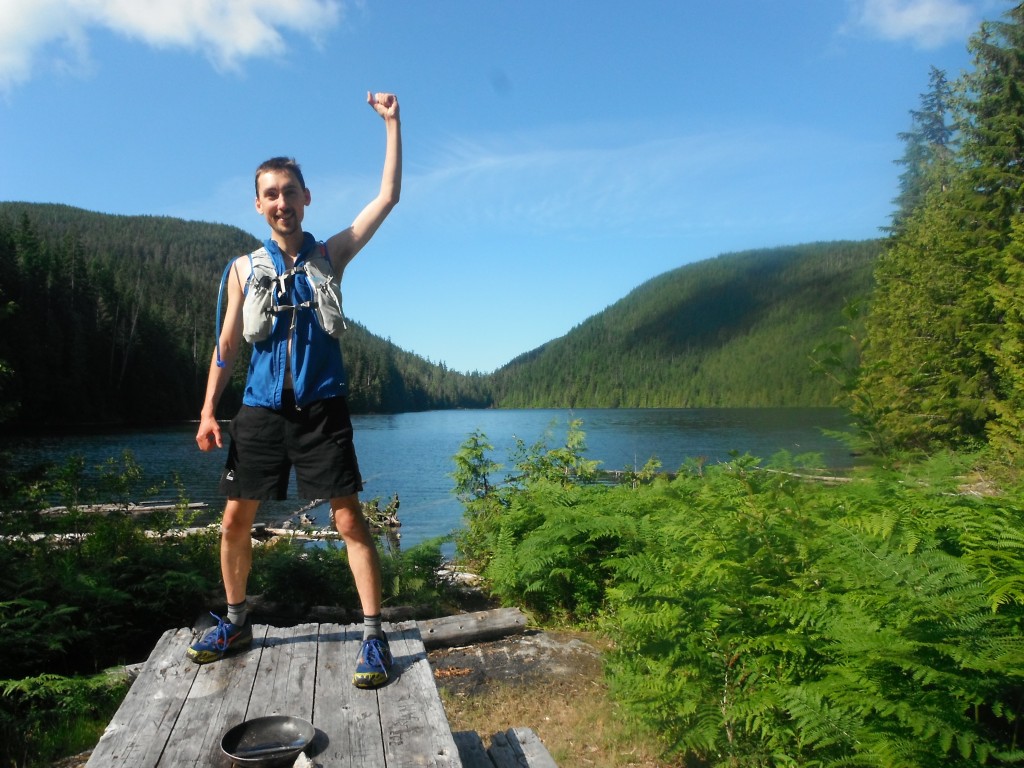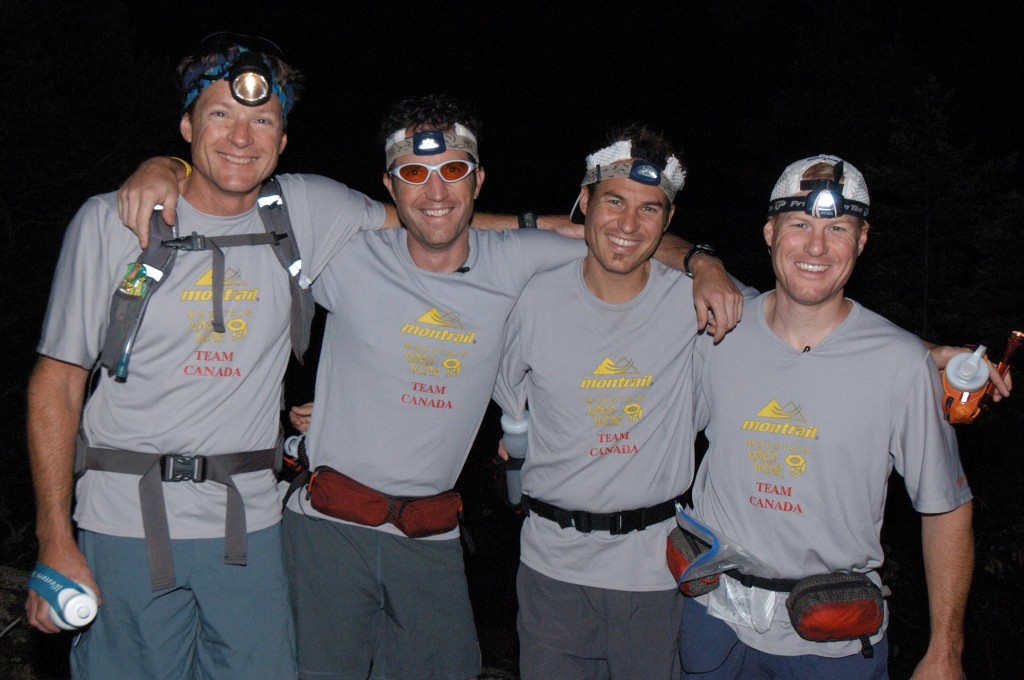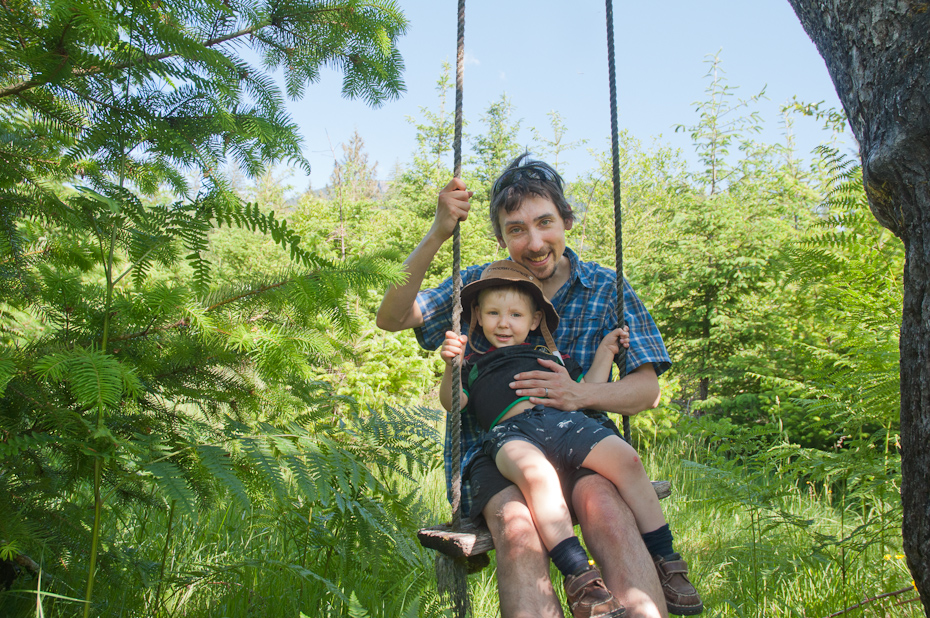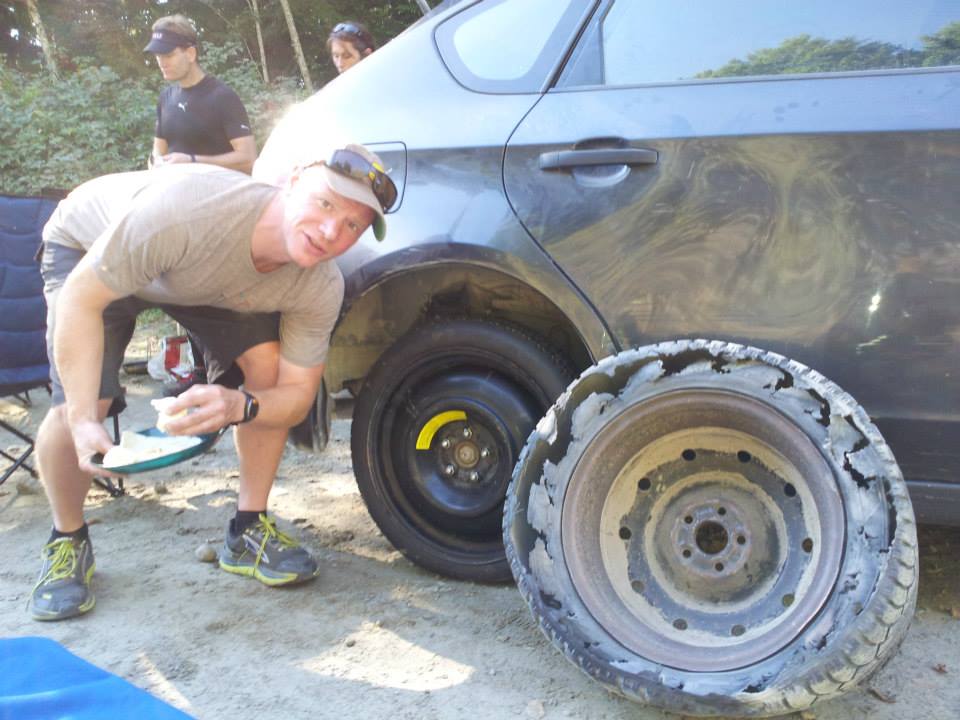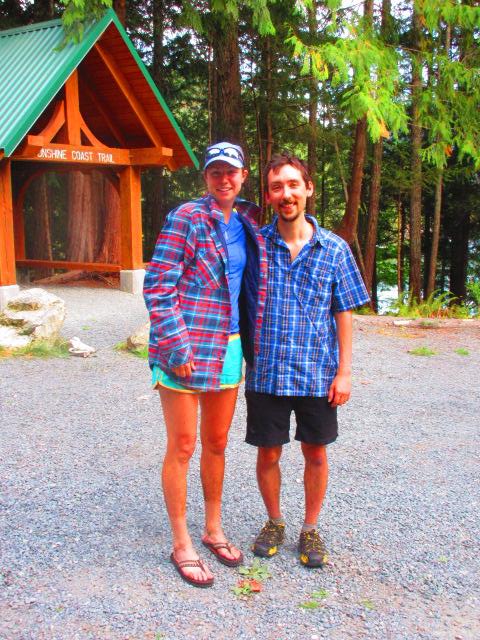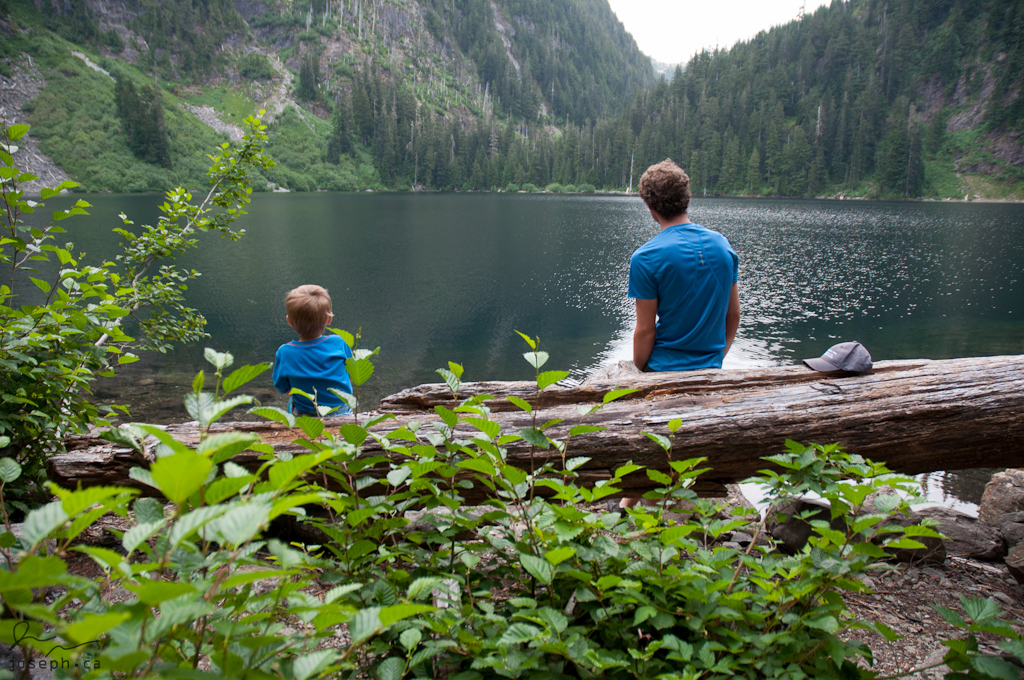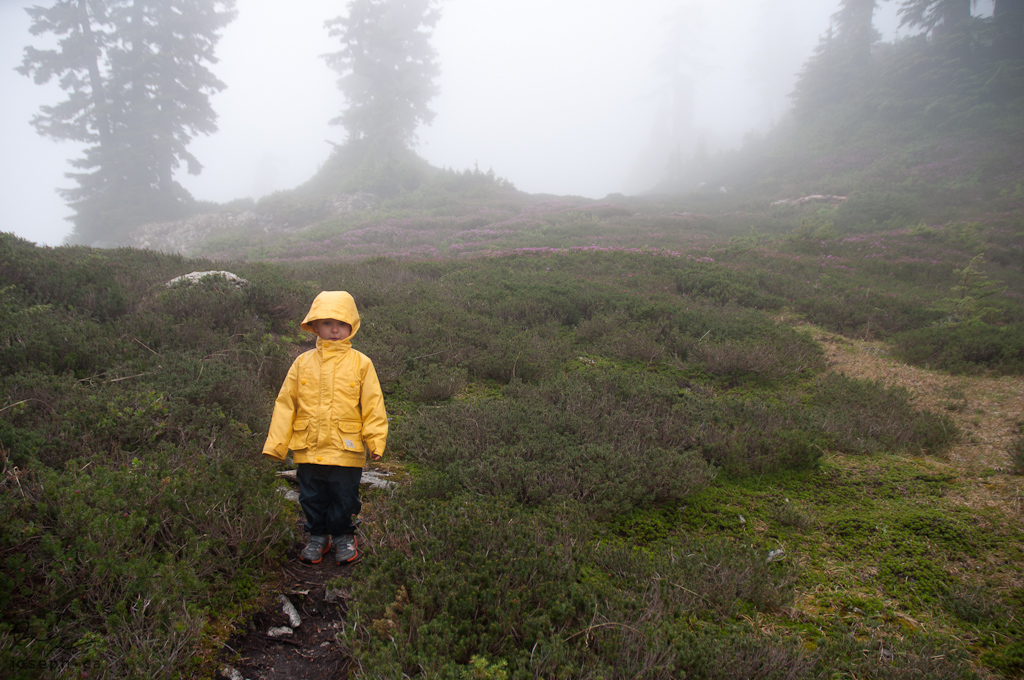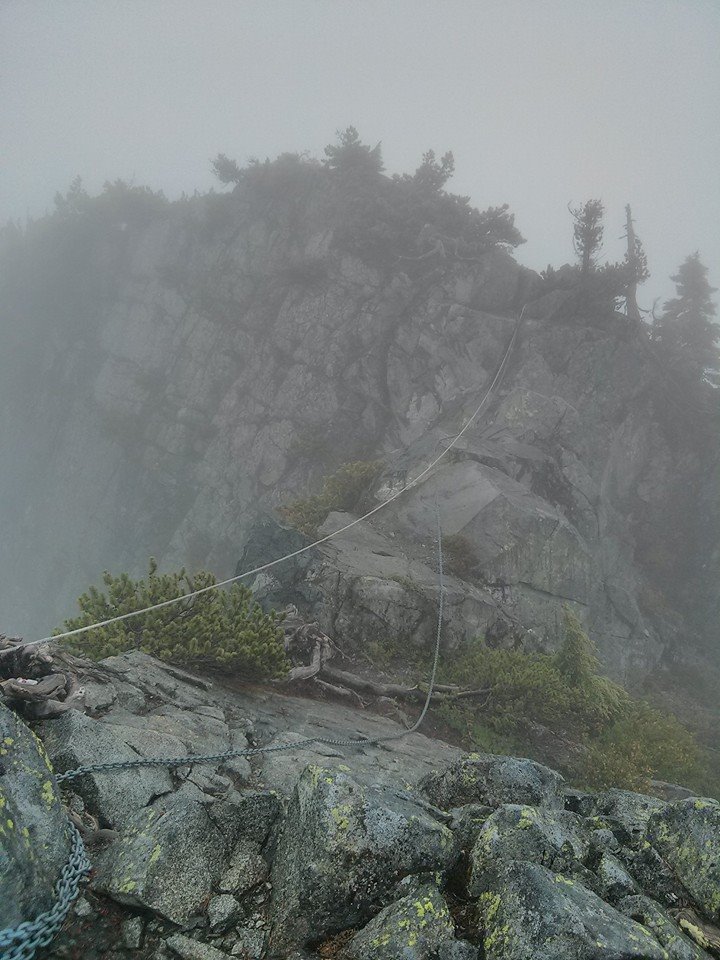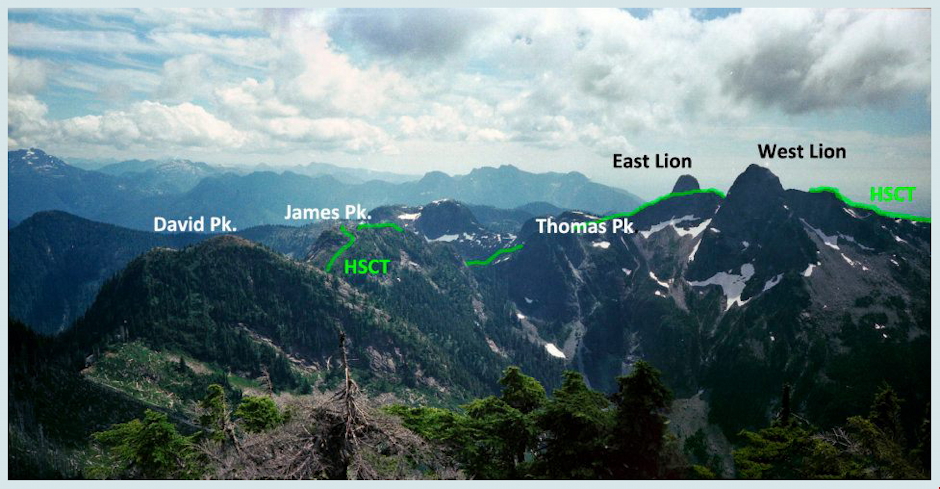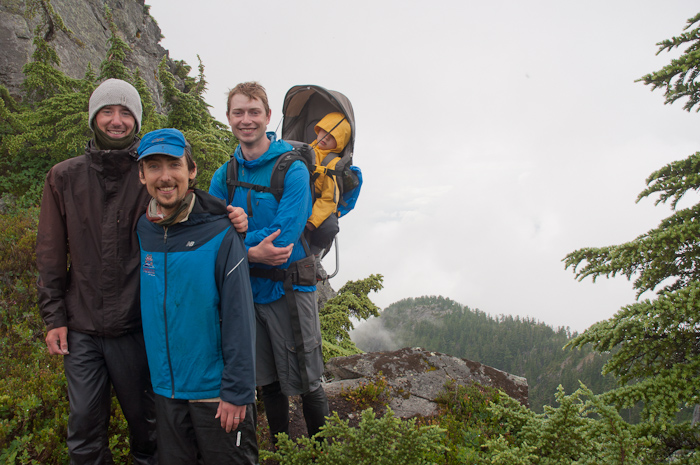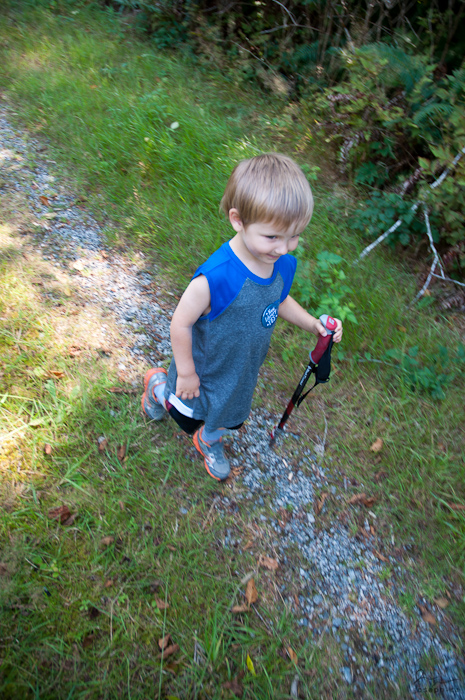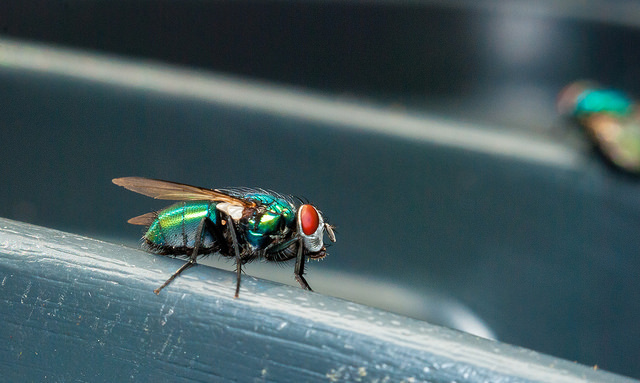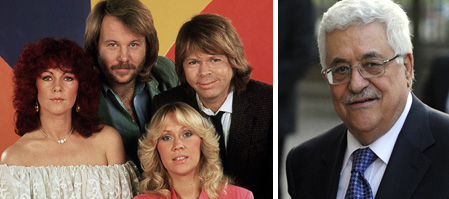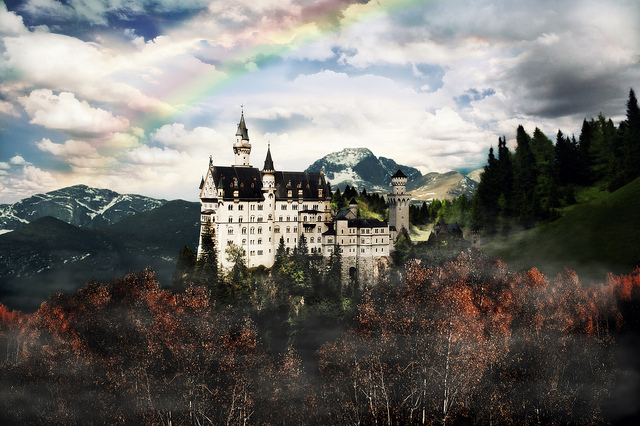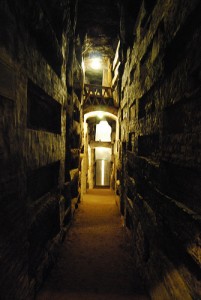This was going to be a story about laughter and rocket-powered pandas, about comicbook dreams and hilarious runs through the September sunlight. I was going to tell you how I beat the odds, came back from my injury to win the glory of a full marathon. But on the way to the finish line, the story changed. Now I have to tell you more, about a truth that so often eludes us. Flitting away like sunshine through autumn branches. The truth is that every day on this green earth could be our last. I’m here to tell you about love, and loss, and the reasons that we run. I’m here to tell you about Beat The Blerch.
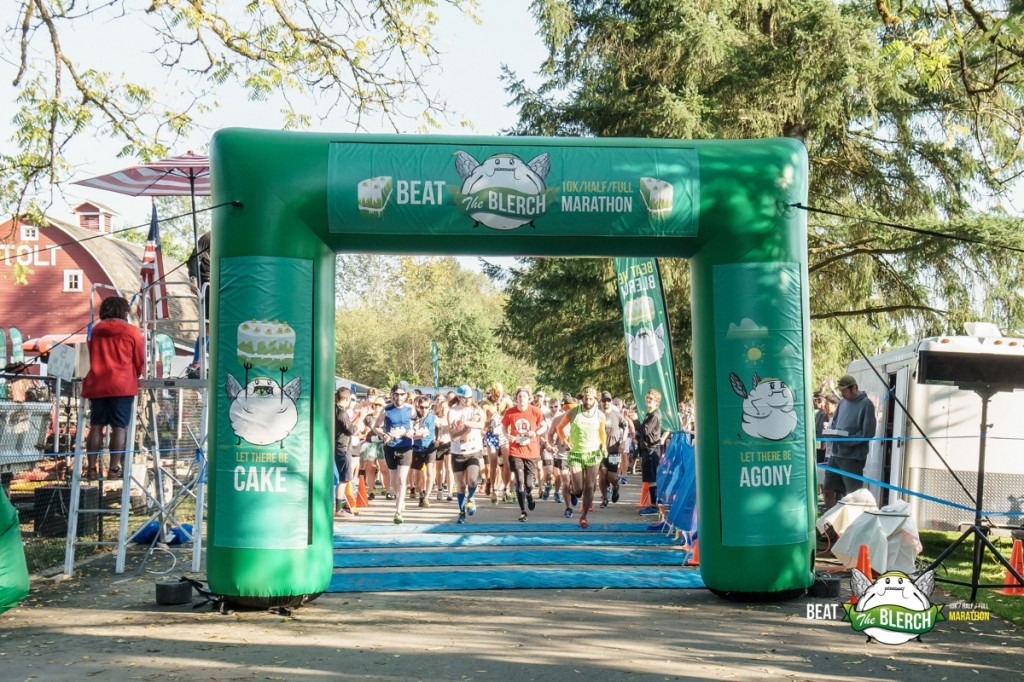
- All race pictures courtesy of Comer Photos. Free of charge, minor miracle.
I awoke with a start, sleep no longer possible in the pre-dawn light. Kevin’s little head was nestled on my shoulder, Ryan’s little elbow pressed lovingly into my side. I checked the time, steeled myself as best I could. Then I sat up in one fluid motion, just a whisper of sleeping bags, Ninja Daddy unleashed. No one stirred, because I am ninja. Gingerly I unzipped the tent door, stepped into a field wet with dew. I was ahead of schedule, but already I could feel my nerves building up. Border delays a day before had cost us our reconnaissance, and I wasn’t exactly sure how to get to the start line. I put on my race gear, everything except the shoes. I was standing in a goat pasture, and there was far too much poop around at the present time. When you go full marathon, it’s no fun to have a shitty run. And not at the temperatures they were predicting: a late September surge to 34° C (93° F). I had woken up in America, far off the beaten track. A farming town called Carnation, Washington. Best to control the one factor I could, and keep my shoes clean. Clean shoes are good.
Breakfast was late, and we scrambled to get the kids prepared for the day as our hostess scrambled to scramble our farm fresh eggs. When they finally came, the meal was insanely delicious. I could hardly eat any, my heart was beating so fast. Why the pre-race jitters? What was I scared of? Six weeks before, I couldn’t walk more than half a mile without sitting down, the stitches in my knee pulsing like electric shocks. I was just lucky to be here, lucky to put my feet on the start line (if I could find the start line). God I was nervous! Beside me, my siblings were sweating it out just the same. Kyle was worrying over his first half marathon like a dog worries a bone, and even normally calm Laura was getting jumpy, wondering why on earth she should care about her third 10k. We really had to go. With less than half an hour to gun time, we sped down the dusty road towards Tolt MacDonald Park.
One of the joys of traveling beyond your country is how smartphones become a sort of glorified iPod, unable to see or care where you are. We rattled into town with old fashioned verbal directions bouncing around in our brains, arriving with just 12 minutes to spare. I said my goodbyes, took off running through the parking lot. I was still a half mile out from the start line, and this mad dash would serve as my warm up. I followed green arrows past rows of porta potties, past kids carrying rolled up banners, runners lazily arriving for later starts. Of the 2000 participants of Beat the Blerch, only 10% were going full hog. The rest were going half marathon (half hog?) or 10k, and the path was full of these people. A lot of them begin to snicker and giggle as I went past, and I wondered fleetingly if I was dragging toilet paper behind me. Thankfully it was just my bumper sticker: “IT’S MY ACTUAL BIRTHDAY — STOP EATING MY CAKE!”. Katie had pinned it to my back, and this must make people happy. Unless I had forgotten to put on shorts, and I really was in a runner’s nightmare. Okay, shorts intact. I made it to the start line, fist bumped my friend David as he rose majestically from the crowd. Both of us had suffered from training disruptions: mine from falling off a mountain in July, David by climbing up every other mountain until he had no time left for running. But we were here, sunglasses in place, grinning and growling. Ready to go, ready to finish. Ready to run.
At five minutes to 9, a man in an enormous green fat suit stood up and addressed the crowd. The air rippling through his outfit made him look like a creature never before seen on earth, a kind of Incredible Hulk Leprechaun who was also an astronaut wearing a sweatband. If you are a person of size looking for a new self image, I suggest this one: it’s pretty cool. This man was in fact The Oatmeal, also known as Matt. This was his race, his idea, based on a comic he put on the Internet about a year ago. “Hey, I’m The Oatmeal. I draw panda bears in my basement for a living,” he said. He seemed kind of amazed to see us all standing there, hundreds of us, with thousands more in the wings. It seemed weird to us too, weird but ever so fitting.
Mr. Oats is an expert on farting mammals, brewskis, kitty cats, grammar, and coffee; it is no coincidence that the Internet loves him. But this guy is more than a funny face. He’s also a real person who owns a fat suit, a Tesla Model S, and a pair of trail running shoes. Maybe even more than 1 pair, since the Internet loves him with real money. He wrote a comic to explain the Terrible and Wonderful Reasons why he runs, a six page epic of ink and sweat and truth. Some of his reasons are not my reasons, but they all make sense, deep down inside. “Running is not about building strength,” wrote Mr. Oats. “It’s about finding strength. And measuring yourself every single day.” Because if you don’t, the Blerch might win.
The Blerch is a kind of obese cherub, an embodiment of self satisfaction and apathy. Why go running at all, when you have unlimited Netflix? Why dash out of your house into a minor rainstorm when you’ve had such a long day? You should just stay in and eat cake. You deserve it. And when you do, the Blerch beats you. Running is a shout in the darkness, a stand against the La-Z-boy life, this modern world we live in.
Our jolly green giant stopped speaking, saluted the crowd. Giant speakers came to life, and the Star Spangled Banner rang out. I looked at the runners gathered around me, men and women in Lycra and tutus and superhero costumes, the vagabonds and hipsters, the ultra runners and weight watchers. All of us so different, but here right now, shoes on the tarmac, toes to the line. Who cares about the finish, this is where I feel most proud of us all. Then the airhorn went off, and we ran as one under the bright green archway. I dodged a support post and there was The Oatmeal, bounding out of our way like an overweight gazelle. His hand was out towards us like the pope, like he was the emerald pope of running. I dodged sideways, planted great big high five in the royal palm. It felt like latex, like fist bumping your doctor during surgery. It felt good.
Then we were out, running along a feeder path towards the Snoqualmie valley trails. I was running beside a man wearing an invisible tuxedo, and I was okay with this. His grin flashed like a thousand lumens, almost lighting the bridge we ran under. The pavement ended, and we struck into the unknown. Wide paths, strewn with leaves, old stones, and the occasional pile of something else. “Horse SHIT!” A man gasped beside me. “Are we at the swearing section already?” I asked him. My pace may not win awards, but by God I’ve got quips. I ran for a while, smiling like a gentle idiot, watching the light play across the Tolt river. People were setting to fish from the far banks, casting long flies out into the rushing water. The sunlight touched everything like a painting, like a dream of the way things used to be. For as long as I am able, please let me move like the water. Rushing free and true, over all obstacles. Laughing on my way to the sea.
I had started this thing fast, mainly to swat at The Oatmeal’s hand. Now I throttled back, let the multitudes surge past me. Tuxedo man disappeared, jumping girl jumped on by. “Happy birthday,” they all said, laughing at my bumper sticker. “Happy birthday!” Someone else asked me what I thought about birthday asses, which seemed like a strange question. Never one to be at a loss for words, I said I was WORKING IT right now. That was apparently the consent she needed to swat me right on the butt, causing quite a lot of hollering (most of it not from me), and now I know what birthday asses are all about. Heaven help the Canadian, my friends. Heaven help him now.
I merged onto another path, this one chock full of Half Marathoners. Suddenly I was running past hundreds of people, feeling sleek and fast although my pace was unchanged. The mobs parted for us, the crazy and the few. And as I went past, they began to sing. People I didn’t know were singing Happy Birthday as we ran through the forest, and the song spread all around me. I grew up in woods not so different than these, a loner most of my life. I think I will remember this as long as I live.
“Next time I run a race, I’m totally saying it’s my birthday even if it’s not,” my spanker called over. “You are SO lucky,” and she was right. Two months before, I fell off a mountain, sliding 20 meters (65 feet) down a slope that had no apparent bottom. Now I was running in light, surrounded by people chanting my name, with a handprint on my apparent bottom. Maybe I never stopped falling, maybe I was lying in a coma somewhere making all this up. I wasn’t about to ask her to pinch me. It’s funny to run a race and realize halfway through that you already won.
The faster half marathoners were already returning, zipping past us on the other side of the path. I kept my eyes open, watching for a fit young man in blue. There he was, my brother. Going strong, still not holding his arms the way I taught him, still with the t-rex moves. But always faster than me. “Kyle!” I yelled. My own arm went out, and we rocked the hardest high five I’ve ever experienced, a full speed hit that seemed to break the sound barrier. I was so proud to see him, near the front of the damn pack, owning his first HM. For the number of times my brother skipped on training, he sure needed to Beat the Blerch. Aw yeah. And suddenly everyone was gone.
I had passed a sign, the HM turn-around point. The crowds thinned enormously, from 1000 to 200, now spread far and wide down the trail. A few remaining runners went round the bend and I was alone, running by myself in the silent woods. And it was hard. The first ten miles had just flown, but suddenly I was dragging. Where was 11? I ran and ran. The path canted upwards, gaining elevation in the sweltering heat. I noticed for the first time how beautiful the forest was, the cedars wreathed in golden moss. A man in his forties was my only companion, a few paces behind me. He caught me on a bridge across some nameless creek, a sprawling concrete footbridge with no people and one perfect pile of horse poop. “Who poops here?” he asked, like a man who finally chooses to break his vow of silence. “And where is everyone?” All runs ask us questions, but sometimes there are no answers. Sometimes you just keep running.
My life was in slow motion now, caught in amber. Runners slowly passed me, faltered, faded back. A dutch foreign national caught up, and asked in a wonderful accent if I was the other foreigner. “There’s always someone,” she said. “Well, do Canadians count?” I asked. The runners nearby took a vote, and we agreed. Canadians count. I gave her some travel tips for my country, my great foreign land to the north. Then I let her go. She took a long time to disappear. “Happy birthday,” she called back. “Thanks,” I whispered. Then gunshots rang out.
Bang! Bang! Bang! The valley shook with sound, sharp and unmistakable. These were no pea shooters, these were serious munitions. A small pause as the patriot reloaded, then another series of reports, at least eight. No one dove for cover, so I could only hope that a shooting range lay nearby. This was not the kind of run you fall asleep on, not a monotonous jog through big city streets. I was awake. I could walk later.
My bottle went dry at Mile 14. I had been using the plentiful aid stations as a kind of car wash service, dousing myself with Dixie cups as I spend past. Now I needed a refill, and with great delight I stumbled into the final aid before our turning point. Only problem was, I could not open my bottle. My hand gripped at the top uselessly, laminated in sweat. My bottle seemed to be glued together with contact cement. A volunteer approached me, a girl with arms like small twigs. She opened the bottle easily, amazing me with her superhuman strength. I accepted a full bottle back, started to run as I tore open a packet of electrolyte powder. I stumbled a bit, hands twitching over the powder like I was addicted to something else entirely. I got most of it in, added a powder coat to my sweat stains. Then I was into a tunnel, long and beautifully cool, running blind with people coming and going around me, running for a circle of light that winked and shone like a power button in the dark. I left the tunnel, noticing for the first time how hot the day actually was. I was more than two hours in, and noon was approaching. But here was our own turning point. “Pick it up, birthday boy!” my spanking nemesis called as she ran past. Then I was around and down, heading back towards the tunnel, the aid, and the finish line. Still so incredibly far away.
Although the slope was with me now, I wasn’t gaining speed. My birthday ass was dragging, and the miles were dragging too. There’s no avoiding it: when you take 3 weeks off your training plan to fall down a mountain and put your leg up in full recovery, it cramps your style. Don’t say that word! My legs cramped a bit, then recovered. I heard some distant sirens, someone being pulled from the course. I tromped past the gun range, tried to reassure the marathoners who were still coming up. “Just keep running!” Just keep running.
I passed a girl walking like a zombie, shell shocked and quiet. I passed her, and suddenly I had to walk too. My legs were steaming. I couldn’t run, and the Blerch sat heavily on my shoulders. In a few minutes, zombie girl passed me at a kind of stumbling march. This was it, the serious part of the race. The part where you live in the shadow of the wall. I threw my mind back to my last long run, pacing Nicola G down the Sunshine Coast Trail. Nic bit off 180 kilometers of singletrack, smashed the course record to smithereens. What was her secret? What had I learned? We already had the same shoes, we were both fairly calm people. Our running style was similar. But what did she do? I did remember one thing, the way she was bizarrely enthusiastic about small landmarks ahead. “Only half an hour to the next ridge, that’s so cool!” Never mind the 24 hours after that. Break it down, that must be her trick. Break it down, before it breaks you down.
At the time, I was looking for Mile 22. I had no idea how I could run another 4 miles, so I moved for 22 like it was the finish line. I even wrote that marker a love song, a piece of poetry with all the creativity that running a marathon gives you. “Twenty two twenty two, where are you? Twenty two twenty two, where are you?” I whispered under my breath. If zombie girl heard me, she gave no sign. And suddenly, to my amazement, there was 22. And I was still running. I licked dry lips. “Twenty three, twenty three, where you be?” And with my head held high, I reached the last aid station.
The last aid station had a couch, an enormous comfy couch. On the couch was a sasquatch. Was I hallucinating? I didn’t even consider it, just walked right over and shook his hand. “So there you are!” I cried. I hadn’t realized just how badly I wanted to meet a sasquatch, until now. His grip was strong and friendly. “Why don’t you sit a while, take a load off? It’s your birthday, buddy.” And for the second time today, a group of strangers broke into song for me. Only this time, they were lead by a sasquatch. It was a beautiful song, filled with haunting birthday harmony, and kind of like a lullaby. The couch was damn comfortable. Who was that sitting beside me? Just a Blerch. That’s cool, Blerches are cool. This one was a girl Blerch, and she seemed tired. I was tired. Oh well. Nicola would be going by now. It was time to get going. With a sigh, I bounced to my feet. “Off so soon, brah? Why don’t you stay a while?” There were more Blerches around me than before, their eyes gleaming in the afternoon sunlight. I made to brush them off. No other runners were left in sight, either gone on without me or fallen at this last comfy crucible.
“I gotta go, man…” I started to walk. Left foot, right foot. “Do you like Game of Thrones?” a kindly Blerch asked me. “How about Batman? Batman is awesome. Let’s stream the movie now! Come on back to the couch and relax! No one knows how long a marathon is anyway. You could tell them it’s 23 miles, and they’d be like Good For You Dude! So what do you say. Do you wanna chill with us? Do you wanna take a break, take it easy? Do you wanna… aw… ” and like stepping out of a marshmallow pile, I finally unstuck myself and broke into a run. Not a sprint, not a blistering pace setter. Just enough to get away. I ran and ran, leaving the doleful Blerches behind.
Nothing could to stop me now. I was proud and free, like a slow moving majestic elk. I strode past two women, who inexplicably called after me: “Aw, you are so cute!”. I was closing the final gap, rolling up that first mile of trail. I passed a guy who got daggers in both legs each time he flexed them; his pace was suffering a bit because of this. Then I was under the bridge and on to the paved feeder path, feeling the true heat of the day. When you run for a number of hours, you become separated from your environment even as you become immersed. Light ceases to blind you, heat ceases to burn you. I came in running hot, sweat covering my body like a hard coat of plastic, but at my core I was shadowy cold. The sunlight on my shoulders felt like an embrace, touching me in these last moments with fleeting warmth. Another few turns and I could see it, a puffy green arch, the finish line. I scanned the crowd for faces, needing to see them, their smiles. Kyle and Laura we standing just ahead of the arch, palms towards me. Welcoming me home. Some 275 minutes before, I had dodged to my right and high-fived the mighty Oatmeal. Now I dodged right again, hand out beseechingly. Smack! Smack! Our palms connected, and at that moment both of my legs locked up solid. Turns out that dodging sideways was no longer on the menu. With the finish line just ten feet away, I hobbled, hopped, and leaped towards victory. And I finished, I staggered across the line and a nice person took my shoe tag away and gave me a medal. My son came running from the crowd, tugged somewhat dangerously on my shorts. “Daddy, you ran an entire marathon! Did you know that?”. I did know that. The Blerch was beaten, the fives were high. My buddy David was right behind me, unstoppable after a hundred mountains. Kyle had finished in the top 10%, Laura ran her fastest race ever, I came in out of the cold. We had survived.
And yet…
(Sunlight through the trees, leaves rustling in the wind. Sirens on the breeze, under a bluebird sky.)
On the way to the finish line, a man we didn’t know began to feel tired. There was less than a mile ahead of him, so he did his best to press on. Evan Sebenius was about the same age as my brother; like him, Evan was running his very first half marathon. His feet stumbled on the feeder path, and he fell just 200 yards before the line. Runners clustered around, offering water and chews, putting their own plans on hold. Forming a protective circle around him. The first medics to arrive yelled for backup: subject was semi-catatonic, with no palpable blood pressure. Somewhere off in the woods, I was starting my long run back down the hill. The sirens I heard were for Evan, fallen in his hometown of Carnation. Much of what I saw that day, he also saw: the sunlight, the hilarity. Maybe he was one of the singers, maybe he was the first guy to start singing behind me. I’ll never know, because Evan Sebenius didn’t come back. They tried for 45 minutes at the ER, but he never came back.
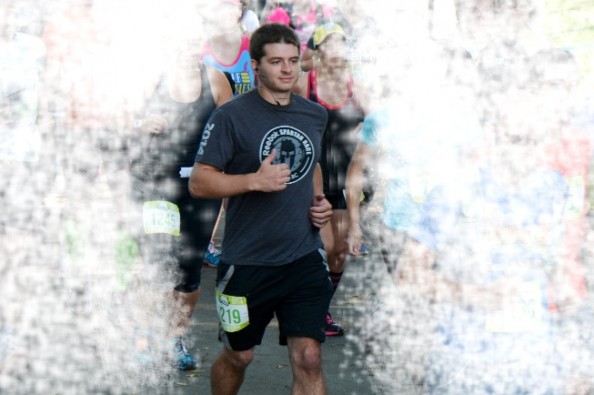
- Image from the Evan Sebenius Memorial Fund.
I’ve been thinking about this a lot. When you spend time sliding helplessly down the face of a mountain, you think about how fragile a gift life is, how vibrant and amazing and fragile. How close have I been to my own line in the sand? That day at Triple Peaks when I should have brought crampons instead of snowshoes, inching and slipping just above the ice cliffs. That time we were lost overnight on a frozen ridge line, as temperatures plunged and our headlamps began to fade. Biking casually home from a service call when I had to swerve off the road, just missing a minivan speeding the wrong way along the 101. All the bears I have met at close quarters, especially the ones that charge me. The time my flashlight died in the woods where a cougar had just been sighted, and I only got out by lifting my laptop above my head, using it as a beacon in the night. Looking back, these things seem stupid risky. Going outside seems risky, and maybe the Blerch was right. Maybe bad things come to those who try.
That’s another thing we think about, we the fallen. We think about how much love is in our hearts, for our friends, our partners, our kids. On November 2nd, runners everywhere will join to “Run Evan In“, symbolically finishing the race that he could not. His family has been overwhelmed by pledges of support, by the way this community of sweaty action people have come together in solidarity. By the one thing that endures when someone is gone; by love.
Before my leg was healed, for practice, I would march around my house with baby Kevin on my shoulders. Whenever we passed by the front door he would give a kind of leap, kicking me neatly in the chin. My son wanted to glide right off the summit of Mt. Daddy and into the arms of adventure; he wanted to open that door. The world outside was big and loud, and that world had messed me up, put me (and his brother Ryan) directly in harm’s way. And yet… this world is inseparable from our life.
If Kevin jumped high enough and fast enough, or if Ryan asked in a really nice voice, I would go and get my keys. I would limp outside with my tiny team of sons, embarking on a painful quest around the block. Walk 50 paces, rest. Walk 50 paces, rest. Sometimes our cat could come with us, because I could never lock her inside. This world, this place where we all live and die, this is only life. Life in all its grandeur and horse shit, life in its breathtaking miracles and stupid tragedies. I can’t not try, I can’t see the door without feeling my own heart leap. How many heartbeats do we have left, you and I? With luck and kindness, we may yet live to see our children grow. See them taking their own risks, some that they seek and others that seek them. May we live to fall and climb again, as long as this fair world will have us. May our hearts be brave, even in the face of loss. May we all have our moments in the sun.

